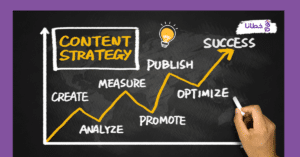table of contents
In a rapidly evolving digital world, digital marketing data has become essential to the success of any marketing strategy. This data provides companies with valuable insights into consumer behavior and promising opportunities. This article will explore using this data to improve marketing performance and achieve company goals.
What is e-marketing data analysis?
Digital marketing data analysis is the process of collecting and analyzing data related to a company’s digital marketing activities. This process aims to generate valuable insights and useful information to improve digital marketing strategies and achieve the company’s goals.
Some examples of e-marketing data that are analyzed:
1- Website data:
- User behavior on the site.
- Engagement and conversion rates.
- Sources of visits.
- Movement rates.
2- Social media data:
- Successful posts and campaigns.
- Fan base growth.
- Interactions and posts.
3- Advertising campaign data:
- Targeting the target audience.
- Campaign cost vs return.
- Click-through and conversion rates.
4- Email data:
- Unsubscribe rates.
- Open and click rates.
- Share content.
This data is analyzed to provide insights into consumer behavior, the effectiveness of marketing strategies, and potential areas for improvement. These insights enable companies to make informed decisions and improve their marketing performance.
How to use e-marketing data to improve marketing performance and achieve company goals

1- Analysis of electronic marketing channels data:
From website click-through and conversion rates to social media activity and the effectiveness of advertising campaigns, digital marketing data provides insights into the performance of various channels. Analyzing this data helps understand the strengths and weaknesses of the digital marketing mix, enabling companies to focus on the most effective channels.
2- Using data to improve customer experience:
By tracking user behavior on your website, you can gain insight into their preferences and purchasing habits. This data helps you personalize the experience for each customer, improve your website design, and deliver more relevant content. As a result, you’ll see higher conversion rates and customer loyalty.
3- Competitive data analysis:
It’s not just your company’s data that’s important, but also understanding your competitors’ data. By monitoring and analyzing their digital activities, you can gain valuable insights into what’s working in your industry and future trends. This information will enable you to develop a more effective and competitive marketing strategy.
What programs are used in data analysis in electronic marketing?
There are many programs and tools used to analyze e-marketing data, which help companies gain valuable insights and improve their digital strategies. Some examples of common programs and tools are:
1- Google Analytics:
- Provides information about traffic, user behavior, traffic sources, and content performance.
- A popular web analytics tool that provides in-depth data on website performance.
2- Adobe Analytics:
- Provides advanced data on sales, interactions, and behavior across all digital channels.
- Adobe’s integrated analytics solution for measuring and analyzing digital marketing performance.
3- Mixpanel:
- An in-depth customer analytics tool focused on user behavior and interactions.
- Provides data on customer conversion, customer retention, and user journeys.
4- Kissmetrics:
- Focuses on analyzing and tracking customer behavior across different channels.
- Helps understand customer paths and improve conversion rates.
5- HubSpot Analytics:
- Helps measure the performance of content, campaigns, and different marketing channels.
- Provides integrated marketing and sales data through the HubSpot platform.
Best Digital Marketing Services Company
Khutana Company for Digital Marketing and SEO Services for Your Website. These are some examples of popular software and tools for analyzing digital marketing data. Businesses can choose the solution that best suits their needs and marketing goals.
Types and methods of data analysis in e-marketing
There are many types and methods of data analysis in the field of e-marketing, and these methods vary based on the goals and available data. In general, the main types are as follows:
1- Descriptive Analysis:
- Analyze traffic rates, conversion rates, fan base growth.
- Answers questions like “What?” and “How much?” to understand the current situation.
- Focuses on describing and summarizing current and past data.
2- Diagnostic Analysis:
- Answers questions like “why?” and “how?” to discover root causes.
- Analyzing user behavior and interactions, analyzing the most engaging content.
- It aims to understand the reasons for current performance and identify the influencing factors.
3- Predictive Analysis:
- Answers questions like “What would happen if?” to anticipate future trends.
- Uses statistical models and algorithms to predict future scenarios.
- Predict conversion rates, identify the audience most likely to respond.
4. Prescriptive Analysis:
- Recommendations for improving website design, preparing strategies for advertising campaigns.
- Answers questions like “What are the best next steps?” to improve results.
- Suggests specific actions and recommendations to improve future performance.
These different types of analysis work together to provide comprehensive insights and actionable recommendations for improving your e-marketing performance.
The importance of data analysis in e-marketing
Data analysis plays a vital role in e-marketing, and there are many reasons why it is essential for success in this field:
1- Understanding behavior and trends:
- This knowledge enables marketers to precisely define their target audience and tailor content and offers to them.
- Data analysis helps understand users’ behavior and preferences online.
2- Improving user experience:
- This enables necessary improvements to be made to improve user experience and increase conversion rates.
- Data analysis reveals strengths and weaknesses in website and application design.
3- Measuring campaign performance:
- This helps evaluate the effectiveness of the strategies and tactics used and identify opportunities for improvement.
- Data analysis provides key performance indicators for online marketing campaigns.
4- Improving spending efficiency:
- Careful data analysis helps determine the best channels and means for marketing spending.
- This improves ROI and reduces waste in your marketing budget.
5- Anticipation and proactive planning:
- This helps in strategic planning and developing more effective marketing plans.
- Analyzing historical data enables prediction of future trends.
In general, data analysis is the foundation of successful digital marketing, providing valuable insights and practical guidance for improving performance.
You can read more: How to use email in e-marketing.
Challenges in data analysis in e-marketing
There are some challenges and limitations that companies may face when applying data analysis in e-marketing:
1- Data quality:
- Obtaining accurate and reliable data can be a challenge, especially with multiple data sources.
- Incomplete or error-filled data may lead to inaccurate analyses.
2- Challenges of technology and tools:
- Some companies may face difficulties in selecting and implementing the appropriate tools for data analysis.
- Integration between different systems and software can be complex.
3- Lack of experience and skills:
- The marketing team lacks the skills to effectively analyze data.
- The need to train and develop the capabilities of employees in this field.
4- Organizational challenges:
- Some companies may face challenges in coordinating efforts between different departments.
- Difficulty in creating a data culture within the organization.
5- Privacy and security:
- The need to comply with personal data protection laws and regulations.
- Ensuring data security and maintaining user privacy.
Despite these challenges, data analysis remains pivotal to digital marketing success. Taking full advantage of it requires overcoming these obstacles by investing in the right technologies and skills. This is where experts in digital marketing and marketing data analysis come in. With their extensive experience in this field, Khutana, a digital marketing and search engine optimization company, can help you develop thoughtful and effective marketing data analysis strategies and achieve your goals. To contact digital marketing leaders, email [email protected]. In conclusion, using digital marketing data effectively is crucial to improving marketing performance and achieving your company’s goals. By analyzing this data and applying it to your marketing strategies, you will be able to make more informed decisions and achieve better results. We welcome your participation and inquiries through comments.
Questions about the article: Using Digital Marketing Data to Improve Marketing Performance in 2025
What is one way marketers can use data to improve marketing performance?
Personalized marketing, powered by data, improves customer experiences. By providing targeted product recommendations and specific content, businesses can increase customer satisfaction and loyalty.
How does e-marketing affect marketing strategy?
Digital marketing has a significant impact on businesses’ revenues by increasing visibility, attracting new customers, and retaining existing ones. This strategy can also enhance customer loyalty and help businesses make smarter decisions through data analysis.
How do marketers use marketing data?
Data-driven marketing is an approach to improving brand communication based on customer information. Data-driven marketers use customer data to predict customer needs, wants, and future behaviors. This information helps develop personalized marketing strategies to achieve the highest possible return on investment.
How important is e-marketing?
Digital marketing plays a significant role in enhancing brand awareness. Through consistent campaigns across social media platforms, email, and paid advertising, companies can build a strong brand image in the minds of their customers.
We respect and value your time... half an hour to grow your project
































